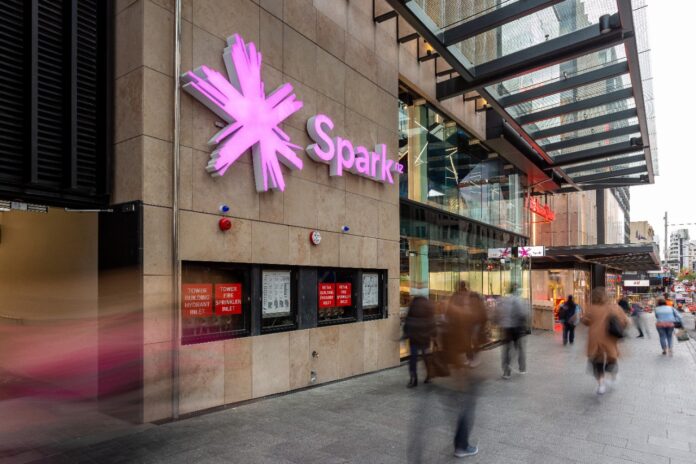Spark aims to sell between 50% and 75% of its data center unit, with the stake expected to fetch around NZ$550 million (US$327.5 million)
In sum – what to know:
PEP deal close – Spark NZ is reportedly finalizing a sale of a majority stake in its NZ$550M+ data center business to Pacific Equity Partners.
Significant divestment – The telco plans to sell 50–75% of the unit, potentially raising around NZ$550M (US$327.5M).
AI-driven competition – The auction drew strong interest from global investors, fueled by rising demand for AI-capable infrastructure.
Spark New Zealand is close to finalizing a deal with Pacific Equity Partners (PEP) for a majority stake in its NZ$550 million-plus data center platform, according to the Australian Financial Review. The sale marks the conclusion of a hotly contested auction fueled by surging demand for AI-ready infrastructure.
The telco aims to sell between 50% and 75% of its data center unit, with the stake expected to fetch around NZ$550 million (US$327.5 million). Spark first disclosed its plans to seek a co-investor in February 2025, saying the move would help fund future data center investments.
The company stressed that no agreement had been reached and that it would update investors in line with continuous disclosure rules.
A growth-driven strategy amid a tough market
Spark’s data center footprint currently consists of roughly a dozen facilities totaling 22 MW of capacity, with another 100 MW-plus in the development pipeline. Its strategy blends large, centralized data centers — including three in Auckland, plus facilities in Waikato, Wellington, and Christchurch — with regional edge sites in Hamilton, Tauranga, and Dunedin.
Revenue from the division rose 13.6% year-on-year in the first half of FY2025 to NZ$25 million (US$14.8 million), underscoring steady demand for hosting and cloud services in New Zealand’s digital economy. The planned expansion, however, represents a major jump in capacity that will require significant capital investment — something Spark is now seeking to share with a partner.
In her February comments, Spark Chair Justine Smyth framed the co-investment approach as a way to “accelerate our data center growth strategy” despite a challenging operating environment. “The scale and pace of deterioration in trading conditions we have experienced over the last year has been substantial,” Smyth said, pointing to weaker IT spending and heightened mobile competition. “This only hardens our resolve to respond rapidly, to transform what is in our control, and to set the foundations for Spark to once again deliver strong shareholder returns.”
Potential suitors lining up
Reports from June suggested significant interest beyond Pacific Equity Partners, from both local and international investors. Additional Australian private equity and asset management firms BGH Capital and QIC were named as likely bidders, alongside U.S.-based infrastructure heavyweights Stonepeak and TPG Capital, and MUFG-controlled Igneo Infrastructure Partners.
Private capital has shown strong appetite for digital infrastructure globally, with data centers increasingly viewed as long-term, inflation-protected assets that benefit from secular growth in cloud, AI, and edge computing demand.
Part of a broader restructuring
The sale process comes as Spark continues to reshape its asset portfolio and shore up its balance sheet. Earlier this year, the company sold its remaining ~17% stake in tower operator Connexa to Canadian pension fund CDPQ for NZ$311 million (US$184 million). Connexa is now jointly owned by CDPQ and Ontario Teachers’ Pension Plan.
The tower divestment, like the proposed data center stake sale, forms part of Spark’s broader cost-cutting and debt-reduction agenda. Following a year in which profits fell 78%, Spark is targeting NZ$80–NZ$100 million (US$48–$60 million) in labor and operational expenditure cuts this year, and up to NZ$140 million (US$84 million) in annual savings within two years.
Balancing expansion and prudence
For Spark, bringing in a co-investor could achieve two strategic objectives: securing the capital to deliver a planned 120MW of new data center capacity, while also reducing financial strain amid ongoing market headwinds. The expansion would dramatically scale its role in New Zealand’s cloud and data hosting market, positioning the company to capture rising demand from enterprises and hyperscalers alike.
At the same time, the move reflects a growing industry trend of telecom operators partnering with infrastructure investors to unlock value from digital assets, while sharing the risks and capital requirements of large-scale buildouts. For example:
- NTT has partnered with investment funds to grow its global data center footprint. Telefónica sold a stake in its Telxius data center assets to Asterion Industrial Partners to fuel expansion.
- ST Telemedia has taken on private equity co-investors to accelerate its global build-out.
- AT&T and Verizon have explored monetizing edge and colocation assets to focus capital on core networks.
The model offers telcos a way to stay competitive in the fast-growing cloud and AI infrastructure space without shouldering the full capital burden — while also tapping into the expertise of specialist data center operators and investors.

